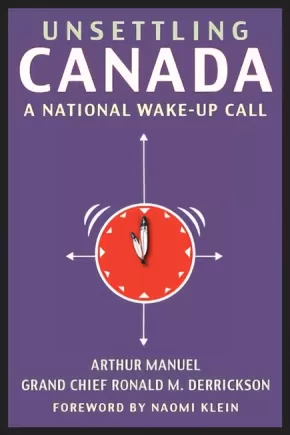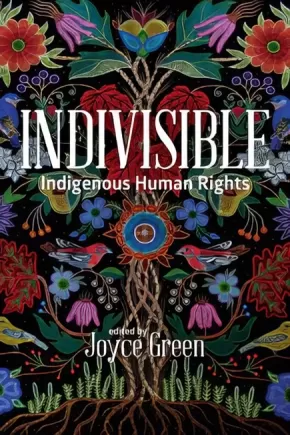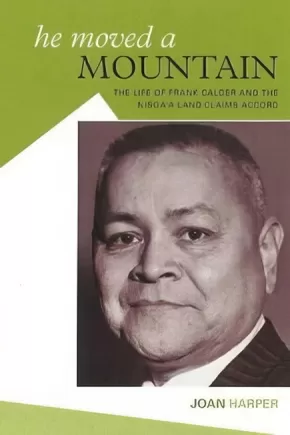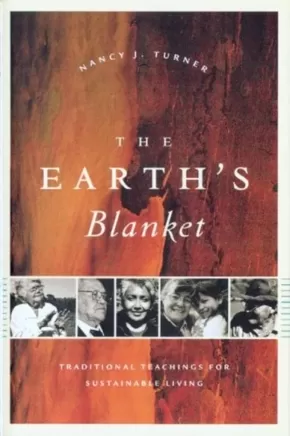Social Responsibility
Synopsis:
Unsettling Canada, a Canadian bestseller, is built on a unique collaboration between two First Nations leaders, Arthur Manuel and Grand Chief Ron Derrickson.
Both men have served as chiefs of their bands in the B.C. interior and both have gone on to establish important national and international reputations. But the differences between them are in many ways even more interesting. Arthur Manuel is one of the most forceful advocates for Aboriginal title and rights in Canada and comes from the activist wing of the movement. Grand Chief Ron Derrickson is one of the most successful Indigenous businessmen in the country.
Together the Secwepemc activist intellectual and the Syilx (Okanagan) businessman bring a fresh perspective and new ideas to Canada’s most glaring piece of unfinished business: the place of Indigenous peoples within the country’s political and economic space. The story is told through Arthur’s voice but he traces both of their individual struggles against the colonialist and often racist structures that have been erected to keep Indigenous peoples in their place in Canada.
In the final chapters and in the Grand Chief’s afterword, they not only set out a plan for a new sustainable indigenous economy, but lay out a roadmap for getting there.
Reviews
“This is the back story of both grassroots and backroom struggles that created the context in which we find ourselves today, one in which a new generation of First Nations leaders is demanding sovereignty and self-determination, and more and more non-Indigenous Canadians finally understand that huge swaths of this country we call Canada is not ours - or our government's - to sell.” — Naomi Klein, from the Foreword
“Pragmatic and helpful, this is a timely book for our fraught and political moment” — Quill & Quire
"Unsettling Canada is a breathtakingly beautiful story of Indigenous resistance, strength, and movement building. Unsettling Canada echoes the power of George Manuel's The Fourth World, centering the heart of the narrative deep inside a kind of Indigenous intelligence rarely shared outside our communities. This is the critical conversation that Canada and Indigenous peoples must have because it is centred on land, and, therefore, it is one of the most important books on Indigenous politics I've ever read." — Leanne Betasamosake Simpson, author of Dancing on Our Turtle's Back
Educator Information
This resource would be useful for courses in history, social justice, political science, and social studies. Recommended for students in grades 10 to 12 or those at a college/university level.
CONTENTS
Foreword Naomi Klein
Chapter 1 The Lay of the Land
Chapter 2 Institutionalizing a People: Indian Hospital, School, Jail
Chapter 3 White Paper to Red Paper: Drawing the Battle Lines
Chapter 4 Occupy Indian Affairs: Native Youth in Action
Chapter 5 Aboriginal Title: No Surrender
Chapter 6 The Constitution Express: A Grassroots Movement
Chapter 7 Don’t Let Them Bully You: A Business Interlude
Chapter 8 A Chief’s Concerns: Finances, the People, and the Land
Chapter 9 Upping the Ante: RCAP and a Landmark Court Decision
Chapter 10 The Battle in the Forest: The Trade in Indian Trees
Chapter 11 Sun Peaks to Geneva: Playgrounds and Fortresses
Chapter 12 Taking It to the Bank: Accounting for Unpaid Debt
Chapter 13 The Fourth World: A Global Movement
Chapter 14 Line of Defence: Side by Side for Mother Earth
Chapter 15 No Half Measures: The Price of Uncertainty
Chapter 16 Days of Protest: Young Activists Come Together
Chapter 17 The End of Colonialism
Afterword Grand Chief Ronald M. Derrickson
Acknowledgements
Appendix United Nations Declaration on the Rights of Indigenous Peoples
Notes
Index
Additional Information
288 pages | 6.00" x 9.00"
Synopsis:
A Canadian bestseller and winner of the 2016 Canadian Historical Association Aboriginal History Book Prize, Unsettling Canada is a landmark text built on a unique collaboration between two First Nations leaders.
Arthur Manuel (1951-2017) was one of the most forceful advocates for Indigenous title and rights in Canada; Grand Chief Ron Derrickson, one of the most successful Indigenous businessmen in the country. Together, they bring a fresh perspective and bold new ideas to Canada's most glaring piece of unfinished business: the place of Indigenous peoples within the country's political and economic space.
This vital second edition features a foreword by award-winning activist Naomi Klein and an all-new chapter co-authored by law professor Nicole Schabus and Manuel's son, Ska7cis, honouring the multi-generational legacy of the Manuel family's work.
Reviews
“Pragmatic and helpful, this is a timely book for our fraught and political moment” — Quill & Quire
"Unsettling Canada is a breathtakingly beautiful story of Indigenous resistance, strength, and movement building. Unsettling Canada echoes the power of George Manuel's The Fourth World, centering the heart of the narrative deep inside a kind of Indigenous intelligence rarely shared outside our communities. This is the critical conversation that Canada and Indigenous peoples must have because it is centred on land, and, therefore, it is one of the most important books on Indigenous politics I've ever read." — Leanne Betasamosake Simpson, author of Dancing on Our Turtle's Back
Educator Information
This resource would be useful for courses in history, social justice, political science, and social studies. Recommended for students in grades 10 to 12 or those at a college/university level.
Additional Information
320 pages | 6.00" x 9.00"
Synopsis:
Indigenous rights are generally conceptualized and advocated separately from the human rights framework. The contributors to Indivisible: Indigenous Human Rights, however, deftly and powerfully argue that Indigenous rights are in fact human rights and that the fundamental human rights of Indigenous people cannot be protected without the inclusion of their Indigenous rights, which are suppressed and oppressed by the forces of racism and colonialism. Drawing on a wealth of experience and blending critical theoretical frameworks and a close knowledge of domestic and international law on human rights, the authors in this collection show that settler states such as Canada persist in violating and failing to acknowledge Indigenous human rights. Furthermore, settler states are obligated to respect and animate these rights, despite the evident tensions in political and economic interests between elite capitalists, settler citizens and Indigenous peoples.
Reviews
“The historic and contemporary challenges faced by Indigenous peoples, be it the tragedy of residential schools, high levels of violence against women, abusive policing, struggles around land and resources, or entrenched poverty are reflective of the disgraceful failure of Canada and other states to uphold human rights. Indivisible is a critical call to governments and Indigenous peoples to take up the indivisible framework of rights protection enshrined in the UN Declaration of the Rights of Indigenous Peoples.” — Alex Neve, Amnesty International
“Well written, fast moving, and well researched, this is book is a rich, smart resource for anyone wanting to break down and understand the human rights versus indigenous rights debate, and to move on to more productive conversations about real political and legal change for indigenous peoples.” — Val Napoleon, University of Victoria
“Have you ever looked back at a point in your life when, had good advice been taken, it would have meant a much better future? This book offers that advice, now. Canadians who want to live well because Indigenous peoples prosper need to read Indivisible.” — Robert Lovelace, Retired Chief of Ardoch Algonquin First Nation, professor of global studies, Queen’s University
Educator Information
Table of Contents
Indigenous Human Rights are Indivisible (Joyce Green)
THEORETICAL AND POLITICAL CONTEXT FOR INDIGENOUS HUMAN RIGHTS
Denying Indigenous Human Rights: Colonialism and Rights Discourse in Canada (Joyce Green)
Two The Race Bind: Denying Aboriginal Rights in Australia (Maggie Walter)
Colonialism Past and Present: Indigenous Human Rights and Canadian Policing (Elizabeth Comack)
Indigenous Human Rights and Decolonization (Andrea Smith)
ABORIGINAL HUMAN RIGHTS — SPECIFIC THEMES
McIvor v. Canada: Legislated Patriarchy Meets Aboriginal Women’s Equality Rights (Gwen Brodsky)
Confronting Violence: Indigenous Women. Self-Determination and International Human Rights (Rauna Kuokkanen)
Victoria’s Secret: How to Make a Population of Prey (Mary Eberts)
INTERNATIONAL AND DOMESTIC CONSTITUTIONAL LAW and INDIGENOUS HUMAN RIGHTS
Free, Prior and Informed Consent: Defending Indigenous Rights in the Global Rush for Resources (Craig Benjamin)
The Presumption of Conformity: International Indigenous Human Rights and the Canadian Constitution (Brenda Gunn)
Undermining Indigenous Peoples’ Security and Human Rights (Paul Joffe)
Additional Information
240 pages | 6.00" x 9.00"
Synopsis:
Dr. Frank Arthur Calder of BC's Nisga'a First Nation was the first aboriginal person to be elected to any Canadian governing body. For twenty-six years he served as an MLA in the legislature of British Columbia. He was the driving force behind Canada's decision to grant recognition of aboriginal land title to First Nations people throughout the country. He accomplished this goal by guiding the controversial request through a series of court cases, finally to the Supreme Court of Canada, achieving success when Parliament, in an all-party resolution, passed a measure recognizing indigenous title. Because of this historic decision, Canada serves as a resource for other aboriginal populations in countries where similar accommodations for aboriginal people have not yet been made. Calder received many honours in his lifetime, including the Order of Canada. The one he most cherished, however, was one rarely bestowed by the Nisga'a Nation: "Chief of Chiefs." While growing up, Frank went to grade 10 in residential school, completed high school and then graduated from the University of BC (in the Anglican Theological College). It took him two years longer than usual to complete university, as he had to return home during the fishing season to earn the money for his tuition.
Synopsis:
Renowned ethnobotanist Nancy Turner brings together decades of experience working with First Nations in the Pacific Northwest. In The Earth's Blanket, she explores the wealth of ecological knowledge and the deep personal connection to the land and its history that is encoded in indigenous stories and lifeways, and asks what they can teach all of us about living in harmony with our surroundings.
Scholarly in its thinking but accessible in its writing, The Earth's Blanket combines first-person research with insightful critiques of Western concepts of environmental management and scientific ecology to propose how systems of traditional ecological knowledge can be recognized and enhanced. It is an important book, a magnum opus with the power to transform our way of thinking about the Earth and our place within it.
Additional Information
176 pages | 6.00" x 9.00"











